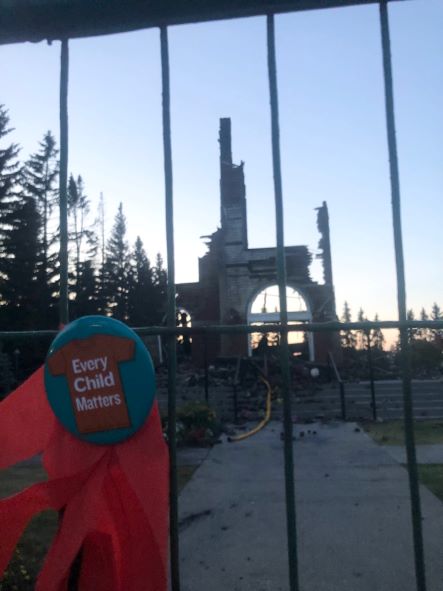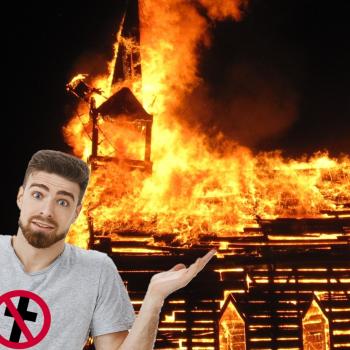With the internet being one of our main sources of communication, social justice has been the forefront of many conversations regarding our culture. In social media, it isn’t uncommon to see people sharing their views. Some (myself included) like to tweet their hot-takes, share articles about events or issues they are passionate about. Anytime someone openly shares their views, they put themselves in a position that may draw attention. I like to think most of us who do this have the best intentions to raise awareness about the issue at hand. Though sometimes we get caught up in the excitement of wanting to be part of something larger than ourselves.
Polarization Kills Nuanced Discussions Over Difficult Topics.
Social justice is nothing new, and anger is often one of the driving forces behind it. There have been (and always will be) issues within our culture that prompt people to take action. That is the burden of the reality we live in. But before I go further, I want to make myself clear that I believe there is nothing inherently wrong with activism. Without it, we couldn’t expect those who are apathetic to push for needed change. I like to think most people who consider themselves advocates of social justice genuinely care about the people affected by the issues at hand. Though I think some who try to ‘double-down’ on their efforts may be seeking some form of validation.
As the leaked news of Roe v Wade potentially being overturned recently made headlines, the cycle of rage has returned in full force. The sinister sides of both the Pro-Choice and Pro-Life movements have reared their ugly heads as people repeat the same old talking points without giving any thought to the reasoning behind their opponents’ position (or even their own for that matter). I like to think we have progressed enough as a society to both protect the autonomous rights and quality of life of women as well as recognize the inherent worth of life from conception to death. Since polarization inhibits nuanced discussion over difficult topics, many are seduced into either/or groupthink. Thus, making it easy to view their ideological opponents as objectively evil.
Motivated by Virtue or Vice?
People are outspoken about what they are most passionate about. But I also think it’s easy to become so immersed into activism it can feel like there is a constant need to inject it into every conversation. Some would say the very fabric of our culture is political, insomuch that it can feel like you’re not contributing to real change unless your actions are motivated by rage towards something, somewhere. It’s as though if you’re not outspokenly angry about something then there must be something wrong with you as a person – especially through ambiguous phrases like ‘silence is violence.’
I think it’s important to understand what constitutes as virtuous behaviour. When we see injustice happening, it is only natural to react angrily. Anger in and of itself is not a sin when there is a just cause for it (in other words, a righteous anger). Without a strong emotion paired with a premeditated reason, I can’t imagine anything else as motivating to incite change. With all the injustice happening throughout the world, it can sometimes feel like you’re not contributing to the greater good unless you are feeling angry about something. This is why I think outrage can be misdirected and cause more harm than good. Like greed, lust, gluttony, envy, arrogance and sloth, anger is traditionally considered a vice rather than a virtue.
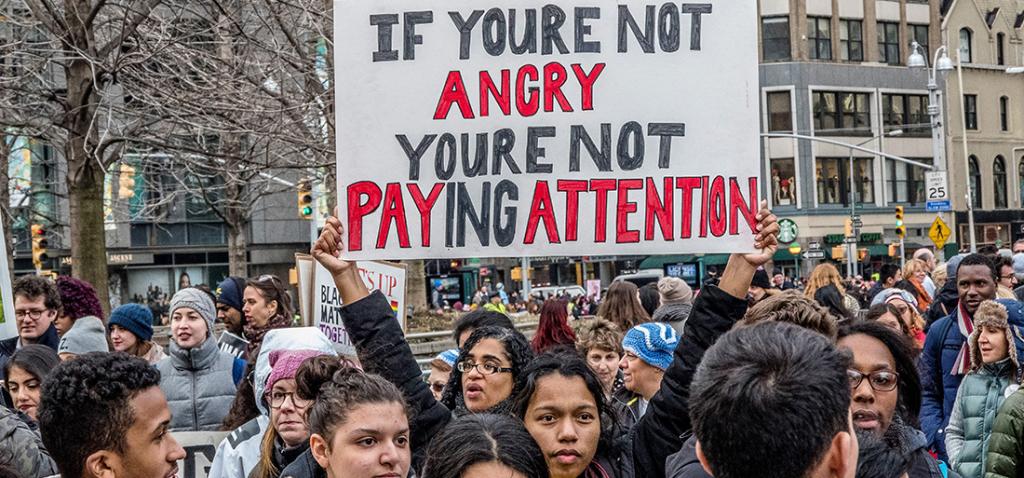
Violence and Destruction
As abortion rights activists have been organizing on social media to interrupt Catholic Masses in the U.S. as a response to the Roe v Wade leak, Catholics are reliving the fear of being targeted for their religious beliefs. This is eerily reminiscent of when revelations of unmarked graves at former residential schools in Canada made headlines. Several church buildings and monuments throughout Canada had been targets of vandalism and arson.
On June 26, 2021, a statue of Pope John Paul II at Holy Rosary Church in Edmonton was targeted. I felt compelled to met with a friend to swing by and check out the scene. Being there was an emotional and eye-opening experience. While most Catholics might view this as targeted hatred, I suddenly had a revelation that this is a call for help. The statue is just a monument, not Saint Pope John Paul II himself. The paint was acrylic, so it was relatively easy to scrape and wash off. But to many Indigenous survivors, this was a depiction of how they saw the Church through their own eyes. The gaze of the Pope looks onward as though he’s addressing the world; and those little hands — they reach, cry and beckon him for his attention. Their blood cries out from the ground to the heavens. All he has to do is direct his attention down at the little ones at his feet.
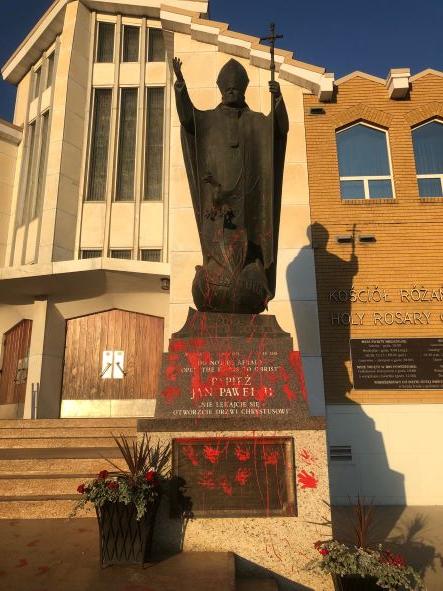
A few days after this incident, the parish of St. Jean Bapiste in Morinville, Alberta (near where I grew up) was destroyed in a suspicious fire. I drove to the town of Morinville to visit the aftermath of the scene. The iconic steeple that used to be spotted from miles away was no longer visible. The wood-carved depictions of the life of Jesus, radiant stained-glass windows and celestial bodies intricately painted in the domed ceiling above the altar reminiscent of the Sistine Chapel were reduced to ash and rubble. As I had been rediscovering the faith of my ancestors, the beautiful church I had attended as a child was suddenly gone. Seeing the remnants in person, I was filled with a wide range of emotions. Rage. Sadness. Empathy. Grief. Betrayal. Fear for what kind of culture my children will be left with when my time on earth is done.
Shifting Goalposts and Broken Trust
In the aftermath, I’ve had conversations with Catholic families and clergy who feared they would one day wake up trapped inside their burning homes. Additionally, a distant elderly relative of mine had to be evacuated from her building next to the burning church. Not only was it a loss of culture, but a threat to the lives of residents in the area. I truly empathize with those whose lives and families were ruined by the abuses at the residential schools. But the reactions of those whom I thought I could trust as my friends were less than empathetic. Some of my non-Catholic friends (who also happened to decorate their front lawns with signs that read ‘Hate Has No Home Here‘) made posts online that poked fun and dismissed these heinous acts as justice served. Had this happened to a synagogue, mosque or even a Pride parade, they would have quickly and passionately denounced them as a hate crime. This type of goalpost-shifting only reveals how their zeal for empathy, tolerance and love is a facade to cover their deepseated resentment towards Christianity. In stark contrast, Indigenous leaders and residential school survivors have condemned the vandalism and burnings as conterproductive to the path of justice and reconciliation.
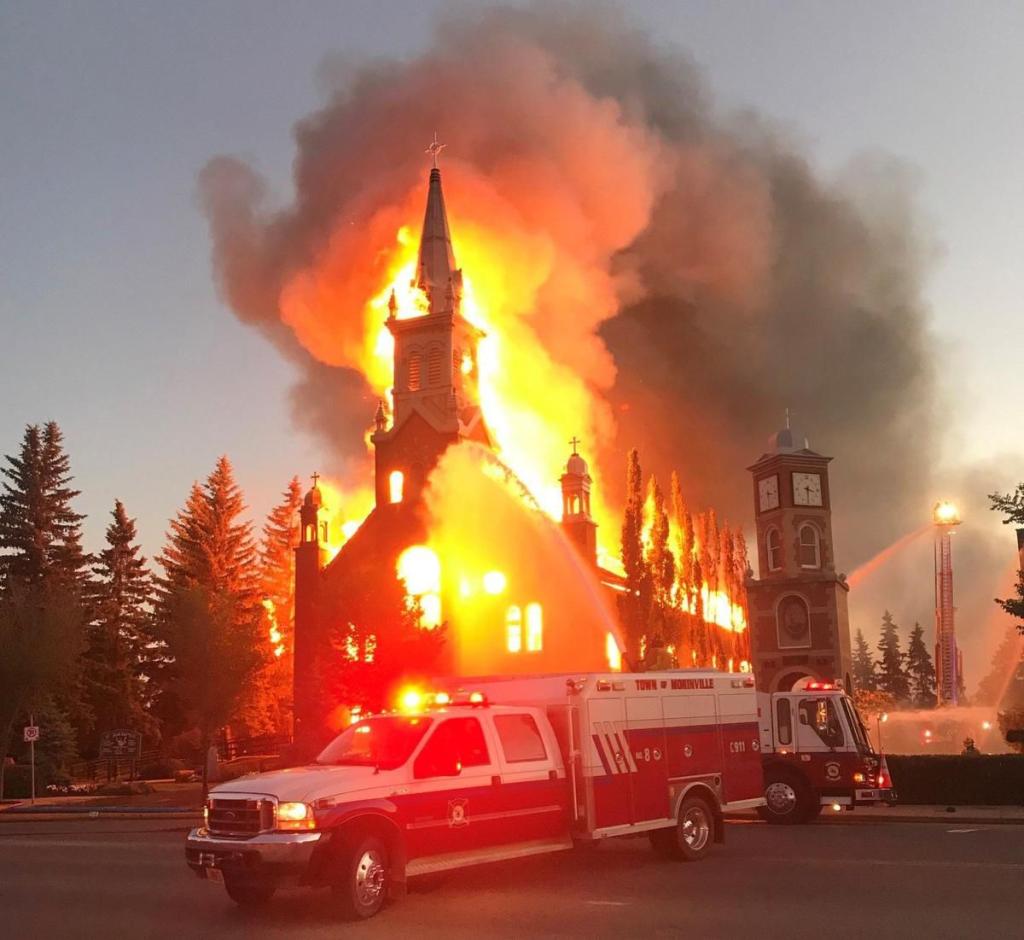
I believe what I experienced as a loss of my own heritage was a small glimpse of the losses experienced by many Indigenous folks. I was repelled by certain Catholic personalities who seemingly defended the residential schools. These same individuals who previously claimed humanity is created in the image of God seemed to view Indigenous people in such low esteem. Though I sympathize with traditionalist Catholics who grieve the loss of reverent liturgy, I feel some fail to recognize the sensitivities of abuse survivors in their zeal for liturgical and cultural reform. Perhaps us Catholics deserve to be shaken to the core for all that has happened? To have a part of your identity ripped away from you and nearly forgotten is a sickening feeling both Indigenous folks and traditionalist Catholics can relate to.
Bitterness, Jealousy and Ego Trips
I think prolonged isolation has aggravated an already widespread mental health epidemic that contributed to high emotions on the political stage? Though I continue to be supportive of efforts to stop the spread of COVID-19, my views of the lockdown have evolved. I understand the frustrations of others who simply aren’t comfortable with receiving a vaccine or have lost their livelihoods because they were compelled to make choices to fit their needs. Admittedly, I think I have been too harsh on those who opposed health mandates that have easily evolved into government overreach.
There is something to be said about not letting your left hand know what your right hand does. I often see friends and politicians post pictures of their involvement in charity, volunteer efforts or political activities online. Their posts usually receive unanimously positive feedback from their friends, family and supporters. To be fair, if people do not share their community involvements, it’s difficult to bring awareness to get people involved. Social media certainly has helped connect people, but it also makes it easy for us to put on a face and give everyone the impression that we are inherently good people. Thus, invoking bitterness and jealousy between those who feel the need to constantly remind others how decent (or not decent) we are. Our zeal for social justice in our culture can easily turn into an ego trip.
No Winners. Only Victims And Villains.
Even as I found myself repelled by these extreme behaviors, these observations have allowed me to reflect on how my own attitude towards others with opposing views can be equally problematic. It wasn’t until someone had called me out for some hurtful comments I had made that I realized I am no better than anyone else who virtue-signals about empathy and tolerance. I allowed my own pain and trauma to regurgitate upon others in hopes of doing the right thing, but only caused more pain by doing so.
When people notice the things we loudly promote, they become equally (if not more) aware of our behaviours that contradict our message. An example I can think of is how many use the Every Child Matters slogan as a filter on social media profiles, while simultaneously believing a fetus is not a human until after they pass through the birth canal. If every child truly matters, does that include the children of many Indigenous women who experienced forced sterilization and abortion? Or do certain activists only believe the lives that matter are the ones they can weaponize in the culture wars? People will utilize political slogans to fit their own agenda, regardless of their original meaning or how hypocritical they sound.
There are no winners in the culture war. Only victims and villains. There is always the possibility we will become an inverted version of the very thing we criticize.
The Culture Is Compromised.
It’s easy to become consumed by perpetual doom until we find ourselves believing our efforts to create a better world are meaningless. No matter where we look, suffering and injustice is as much of a by-product of existence as the air we breathe in. It takes little effort to find hardship, oppression, pain and death because it’s all around us. There isn’t a single culture on this planet that is immune to it. I don’t believe this means we ought to turn a blind eye, but it’s tempting to stare into the abyss and lose our joy.
How much of the culture we once knew or desire to change is worth losing our souls over? With the Russian invasion of Ukraine in mind, what do we gain when we’ve spent all our time ridiculing other people’s values and, hypothetically, our lives suddenly end at the drop of a nuke? If this life is all we have, what do we gain when we find ourselves continually seeking the flaws in others while overlooking our own shortcomings? How much are we trying to change or preserve the culture at the expense of others? If our zeal for social justice is rooted in nothing but anger towards what we think ought to be, how can we experience the joy of appreciating the good things we do have? Or the progress our culture has already made?
I don’t have a sufficient answer to any of these questions. But no matter how we look at it, the culture is compromised. The world is on a steep decline to becoming even more unrecognizable than it is now. If we have no love for our neighbours who are made in the image of God, regardless of how much we strongly oppose their beliefs and values, then we have no soul within ourselves to offer for the good of this world.
